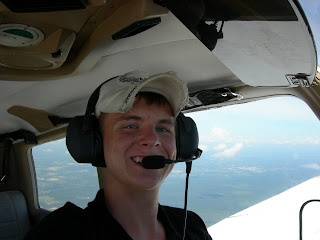Although Open Skies will certainly make more competition on routes, as well as lower fares, Open Skies may hurt the airline employee, the airline, and potentially the consumer in the end.
Article from U.S Today
Today, the United States is expected to formally approve a new "open skies" aviation trade deal with the European Union (EU). The Bush administration has failed to satisfy congressional critics who question the pact's impact on long-standing law and policy limiting foreign control of our airlines. And aviation workers are deeply concerned that this agreement is a down payment on a broader Bush administration strategy to allow foreign control of our airlines and decision making that threatens thousands of American jobs.
This is not hyperbole. Led by Transportation Committee Chairman Rep. James Oberstar, key House members in both parties wrote in March that the agreement's impact is "ambiguous" and "may lead to a change in U.S. law and policy to permit greater foreign control of U.S. airlines." They also warned that legislation may be necessary to ensure continuation of existing policies.
The agreement would allow foreign carriers to enter into franchise arrangements with U.S. airlines. By allowing control over "operational matters" of the U.S. franchisee, it could mean foreign control over fleet acquisitions, route planning, schedules and pricing. Our laws bar foreign interests from controlling these decisions. What if a foreign carrier directs franchisee operations in a way to maximize its own economic objectives? For example, a European airline could have its U.S. partner feed traffic to its international flights, rather than competing more broadly in the U.S. market or developing international services itself. If a foreign airline has control over maintenance decisions, could even more work be shipped overseas to repair stations that may not meet the highest safety and security standards? Could aircraft purchasing decisions favor Boeing's rival, Airbus? Good questions, but to date, no real answers.
The Bush administration defends its liberalization agenda, at least in part, by arguing that U.S. airlines are starving for capital under current ownership and control rules. But in recent bankruptcy reorganizations, several U.S. air carriers have shown that it is quite possible to secure billions in the capital markets without permitting foreign takeovers. Doug Parker, CEO of U.S. Airways, stated earlier this month that U.S. carriers "don't need to go to foreign markets to raise capital ... if you have a good business model." Aviation's real problems -- the increasing costs of fuel and security, and some questionable management decisions -- cannot be fixed with this agreement.
In more than 70 U.S. open skies agreements, we have never put ownership and control rules up for grabs. Last year, the Bush administration tried to do exactly that in a proposed regulation, but the U.S. House of Representatives rejected it by a vote of 291-137 and a Senate committee followed suit. The Bush administration eventually withdrew those proposed changes, but it is now telling the EU that majority foreign investment in U.S. carriers could be permitted.
To see the ill effects of bad trade policy, look no further than our manufacturing industries where failure by our government to take action against illegal trade practices has killed off U.S. companies, ruined local economies and destroyed jobs. For example, from 1997 to 2004, at least 45 steel companies filed for bankruptcy, affecting more than 85,000 workers in communities across the country.
When the EU ministers endorsed the deal last month, they pointed to "second-stage" talks focused on fully liberalized aviation, free of restrictions on ownership and control, and foreign carriers serving point-to-point U.S. domestic markets. This first-stage agreement is nothing more than a ticking time bomb that may well result in European airlines' ability to take over U.S. carriers or operate between U.S. cities. Under this scenario thousands of American jobs will be threatened. Moreover, individual European countries could force withdrawal of the agreement's benefits from U.S. airlines if Washington did not agree by 2012 to allow foreign airlines to buy control of U.S. carriers. U.S. negotiators have set us up to be bullied in our own trade agreements.
Before the ink was dry on the endorsement, European companies were already benefiting. Aviation rules require U.S. majority ownership and control in order to fly domestically. But Virgin America -- a start-up airline based in Burlingame and formed and funded by British billionaire Richard Branson -- now has tentative approval to fly domestically. Branson's U.K. airline, Virgin Atlantic, was a major critic of the "open skies" accord, so the timing of the decision (48 hours before the EU ministers' vote) was hardly coincidental. The U.S. aviation market, the most lucrative in the world, represents nearly 50 percent of the worldwide commercial aviation industry. So when we give away ownership and control protections, or access to our routes and markets, we give up a lot.
American workers have much to lose as a result of this accord alone. Even more ominous for American workers is the possibility that Bush administration negotiators -- in the president's final year in office -- will pursue a second-stage agreement that finishes what they've started today by permitting European interests to secure control of our airlines and serve our domestic markets at the expense of a vital U.S. industry and American jobs.






